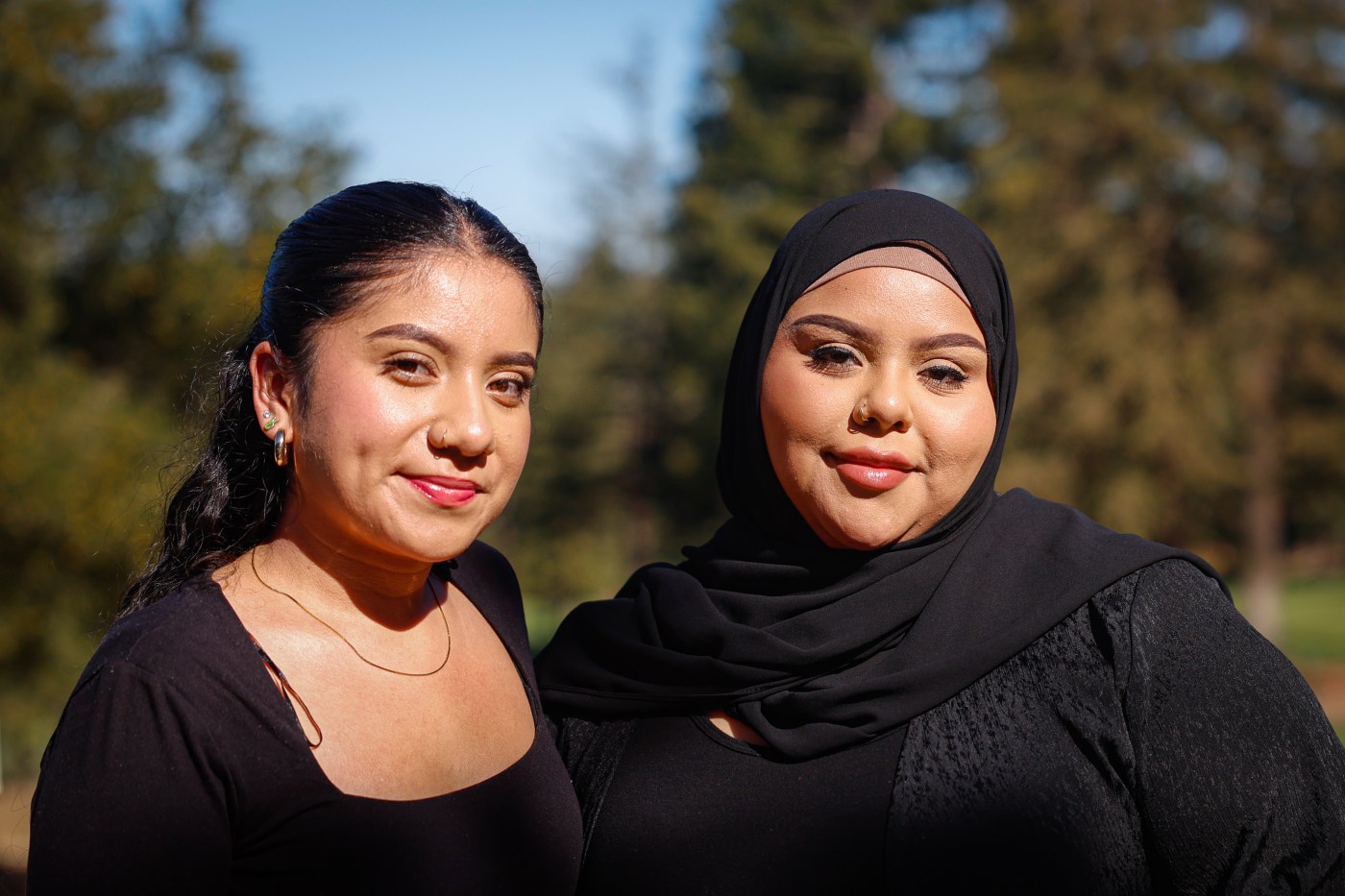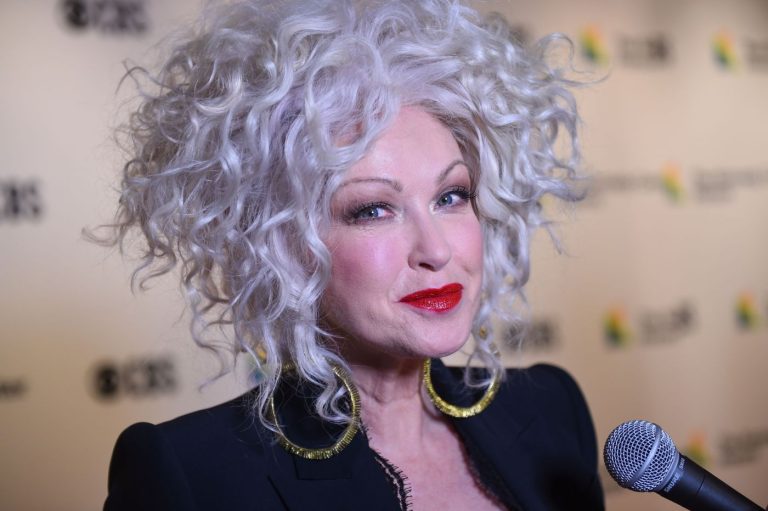Karla Cisneros never imagined she would be able to attend college. She knew her parents wouldn’t be able to afford the tuition and no one in her family had ever pursued higher education.
“Going to college was never in my plan,” she said. “We don’t have the ability even if we want to, due to financial situations. I never envisioned myself pursuing higher education.”
Instead, the San Jose resident planned on graduating from high school and getting a job to help support her low-income family and raise her two youngest siblings.
Five years later, Cisneros holds a bachelor’s degree in sociology, works two jobs — as a substitute teacher and a program coordinator at Sacred Heart Community Services — and owns a small business creating events and floral arrangements.
Sisters Cindy, left, and Karla Cisneros, of San Jose are two PCF scholars, talk with potential donors at The Peninsula’s annual College Fund’s Annual Fall Fundraiser at Sharon Heights Golf and Country Club in Menlo Park, Calif., on Thursday, Oct. 24, 2024. (Shae Hammond/Bay Area News Group)
“Knowing where I’m at currently, it just feels like a dream,” she said. “If you would have told 13-year-old me or 14-year-old me that I’d be here right now, she wouldn’t believe it. But at the same time, she’d be so proud.”
Cisneros was able to attend San Jose State University thanks to a grant from The Peninsula College Fund, a Bay Area nonprofit that provides first-generation, low-income students from San Mateo and Santa Clara counties the resources and finances to graduate from college and achieve their career goals.
The Peninsula College Fund is hoping to raise $24,000 through Wish Book to help one student in San Mateo or Santa Clara county complete college. The funding would pay for the student’s college tuition and books, match them to a mentor, send them to a college and career leadership conference and help them obtain an internship to prepare for their career.
The organization began in 2005 after San Jose teacher Charles Schmuck became concerned by the high college dropout rate of first-generation, low-income youth from San Mateo County and the Mid-Peninsula area.
According to recent data from the U.S. Department of Education and the National Center for Education Statistics, six years after starting college, only 24% of first-generation college students had earned a bachelor’s degree.
Schmuck and the Peninsula College Fund quickly realized helping low-income and first-generation students simply access college wasn’t enough, said the organization’s executive director, Christina Mireles. The organization said students also face financial hurdles, inequitable access to resources, bias and difficulty finding employment after graduating.
Sisters Cindy, left, and Karla Cisneros, of San Jose are two PCF scholars, talk with potential donors at The Peninsula’s annual College Fund’s Annual Fall Fundraiser at Sharon Heights Golf and Country Club in Menlo Park, Calif., on Thursday, Oct. 24, 2024. (Shae Hammond/Bay Area News Group)
“We’re not a college access organization. We’re about college and career success,” Mireles said. “With time, we saw that it wasn’t enough to get students into college…There are so many challenges and obstacles that low-income students, first-generation students face that they really do require support in college if we expect them to graduate.”
Thanks to the Peninsula College Fund’s wraparound services, like providing mentors, helping students access trainings and workshops and supporting them in their search for an internship, Mireles said PCF scholars who began college in 2017 graduated within six years at a rate of 88% – more than four times the national graduation rate for first-generation college students.
Mireles said the number of scholars the organization accepts depends on the amount of funds the organization can raise each year. She said the Peninsula College Fund accepts anywhere from 50 to 85 students a year.
The organization also knows that transitioning from high school to college is a difficult barrier for many first-generation and low-income college students.
Cisneros said she battled imposter syndrome — a behavioral health phenomenon described as self-doubt of intellect, skills, or accomplishments — when she first started at San Jose State University. And with a newly diagnosed learning disability, Cisneros said she reached a breaking point in the last semester of her freshman year and was ready to drop out.
“I was like, I cannot do this. I know my sisters and my family are counting on me, but I just can’t,” she recalled.
Cisneros’ mentor, Eduardo Cortez, helped connect her to mental health resources and guided her through the challenging time. Cisneros said without Cortez and the Peninsula College Fund, she wouldn’t have stuck it out.
“Just knowing that I had the support of them and that they believed in me always did it for me,” she said. “When I didn’t believe in myself, they did.”
The Peninsula College Fund is also supporting Cisneros’ younger sister, Cindy Cisneros, at the University of California at Berkeley. Cindy is in her junior year and pursuing a bachelor’s degree in sociology and data science.
Cindy said she never planned on attending college, but Karla and the Peninsula College Fund showed her that she could.
“My older sister really cemented my decision to go to college because she really did it all on her own,” Cindy said.
She said the Peninsula College Fund and her mentor, Amanda Sarkowsky, helped her grow professionally and personally and realize that she belongs at UC Berkeley just as much as anyone else.
“My interest in school was never the problem. I just think I never fully saw (people like me) in these spaces,” she said.
Related Articles
Wish Book: College of Adaptive Arts empowers students to reach their goals
Wish Book: Kids need a better space to play at San Jose Day Nursery
Wish Book: San Jose State expungement program can change lives of everyone involved
Wish Book 2024: Staying active in the South Bay with the help of transport vans
Wish Book: When caregiving for an elderly parent becomes a burden, Sourcewise offers care for the caregivers
The Peninsula College Fund is also committed to “breaking the cycle of generational poverty,” not only for its scholars but their families, as well.
When her parents lost their jobs during the COVID-19 pandemic and she was forced to quit her part-time job so she wouldn’t expose her family to the virus, Karla said her family faced extreme financial hardship, especially because her parents did not qualify for the stimulus checks.
But the Peninsula College Fund stepped in and provided her family with emergency support and funds for rent, food and other necessities during the pandemic.
Karla said the organization changed not only her life, but her entire family’s life. She said her two youngest sisters will now grow up knowing they can attend college, too. She plans to get her master’s degree in education or data analytics and is counting down the days to when she’ll be able to return to the Peninsula College Fund as a mentor for another student.
“I cannot imagine my life without the Peninsula College Fund. I genuinely mean it,” she said. “They did so much that there’s literally no words I can use to describe how much they’ve done.”
THE WISH BOOK SERIES
Wish Book is a 501(c)(3) nonprofit organization operated by The Mercury News. Since 1983, Wish Book has been producing series of stories during the holiday season that highlight the wishes of those in need and invite readers to help fulfill them.
WISH
Donations to The Peninsula College Fund will help one student in San Mateo or Santa Clara counties complete four years of college. Goal: $24,000
HOW TO GIVE
Donate at wishbook.mercurynews.com/donate or mail in this form.
ONLINE EXTRA
Read other Wish Book stories, view photos and video at wishbook.mercurynews.com.












